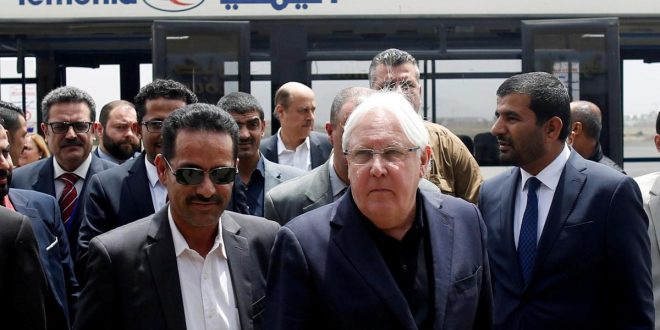UN Envoy: Despite Obstacles, There Is a Swift Progress Between the Warring Parties
YemenExtra
M.A.
The United Nations special envoy to Yemen, Martin Griffith, said Saturday that the parties to the conflict are moving rapidly towards progress despite difficulties.
“Our men were there on Dec.22, eight days after the Stockholm Agreement, I think progress is remarkable and the Security Council has reached the same conclusion,” the UN envoy told Sputnik.
Griffith added that, however, it was difficult to establish peace in Hodeidah after a long war, as this was the first such agreement in two years.
The Special Envoy also noted that the members of the Commission representing both rivals were now meeting in Hodeidah with the United Nations General Command and hoped that within a day or two, a redeployment plan would be put in place.
“We have a very simple agreement, where the United Nations and I are mediators between the parties and will conduct more rounds of negotiations in the coming months … so we have no problems in form, and the only difficulty now is to reach agreements,” Griffith said.
On December 21, the UN Security Council unanimously voted on a UN resolution supporting Sweden’s agreement on Yemen and authorizes the UN Secretary-General to deploy an initial observer team in the city and ports of Hodeidah.
The Houthis, for their part, announced the redeployment of their forces from Hodeidah and its ports and the handing over of the port to the Coast Guards under UN auspices. However, the Hadi government refused to recognize this move, claiming that the Houthis handed it over to other elements affiliated with them.
Regarding the issue concerned with the reopening of Sanaa international airport, Martin Griffith said during an interview with Sputnik that both parties still argue on one dispute, which is whether the airport will be open to international flights or domestic flights or both.
During the interview that was held in Moscow, the envoy hoped that progress in talks on the airport reopening would be made and Yemeni people would eventually be able to “travel just like people in Russia can travel.”
Sanaa airport has been officially closed since August 2016, causing the suffering of the Yemeni people, especially those ones seeking for treatment abroad, to increase. More than 30,000 patients lost their lives after they could not leave the country for treatment. Additionally, 200,000 patients are endangered of losing their lives and are in need to immediately travel for treatment.
United Nations resident coordinator to Yemen
The Humanitarian Coordinator in Yemen, Lisa Grande, was briefed on the situation in the port of Hodeidah and the effects of the destruction caused by the bombing of the port’s infrastructure.
During her visit to the province of Hodeidah, she was told why there was a delay in the arrival of humanitarian aid from the province to the other provinces.
During her meeting with the Governor Mohammad Ayyash Qahim and the governorate’s deputies, she stressed the importance of finding suitable solutions to deliver aid to the beneficiaries in the governorates of the Republic and the need to open the humanitarian corridors linking the governorate and other governorates.

The Coordinator for Humanitarian Affairs noted that the United Nations was in the process of dispatching observers to the port in accordance with the recommendations of the Security Council at its last meeting.
During the meeting, the Governor stressed the readiness of the local authority to cooperate seriously with the International Monitoring Committee and to contribute to the establishment of peace in the province.
Moreover, he urged the UN resident coordinator to inform the Secretary-General of the United Nations and his envoy to Yemen to put pressure on the Saudi-led coalition to begin the implementation of the redeployment in accordance with the agreement of Sweden.
Last Friday, Three civilians were injured and a number of houses were damaged by artillery shelling launched by the Saudi-led aggression using their mercenaries on the ground near the University of Science, in al-Haook district.
Mercenary force carried out dozens of missiles and used machine guns against the village of al-Shijn and its environs within al-Durayhmi in the city. Also, it used medium leveled weapons in targeting 50th Street in the Halid district, while the areas in the East of Hayes were exposed to artillery bombardment.
In addition, residential buildings in the residential area of July 7 were damaged by the intensive artillery shelling of coalition. The forces under the Saudi ranks launched two rockets at the homes of citizens in the July 7 residential area in the Hali district, and also fired three light bombs towards the area of al-Faza.
Spokesman of the Yemeni army confirmed in a statement released on Friday that the Saudi-led coalition mercenary forces have implemented 89 breaches during the past 48 hours, using artillery, rocket shelling, and launching intensive fire on army’s locations.
Saudi Arabia and a number of its regional allies launched a devastating military campaign against Yemen in March 2015, with the aim of bringing Hadi’s government back to power and crushing the country’s Houthi Ansarullah movement.
According to a new report by the Armed Conflict Location and Event Data Project (ACLED), a nonprofit conflict-research organization, the Saudi-led war has so far claimed the lives of around 56,000 Yemenis.
The Saudi-led war has also taken a heavy toll on the country’s infrastructure, destroying hospitals, schools, and factories. The UN has already said that a record 22.2 million Yemenis are in dire need of food, including 8.4 million threatened by severe hunger. According to the world body, Yemen is suffering from the most severe famine in more than 100 years.
This post originally ran on Yamanyoon

